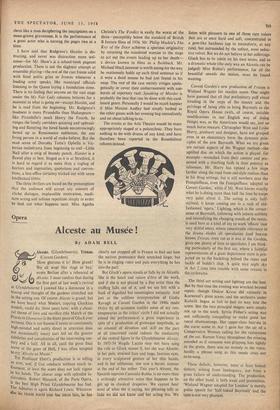Opera
Alceste au Musee
By ADAM BELL Alceste. (Glyndebourne). Tristan. (Covent Garden).
'How glorious it is! How grand! We all wept like stags at bay,' wrote Berlioz after a rehearsal of 1 Alceste. I must confess that during the firstpart of last week's revival at Glyndebourne I yawned like a dormouse in a teacup and thought of the gardens stretched out in the setting sun. Of course Alceste is grand; but we have heard what Mozart, copying Gluckian Models, could do, three years later, with a classi- cal theme of love and sacrifice (the March of the Priests in Idonteneo is the finest piece of Gluck ever written). One is not human if music so consistently high-minded and nobly direct in utterance does not occasionally weary ears fed on the greater subtleties and complexities of the intervening cen- tury and a half. All in all, until the great final scene at the gates of Hell, I was often tempted to cry ' Alceste au Musee: Yet Professor Ebert's production is as telling as ever, and, if Gui conducts without much re- finement, at least the score does not lack vigour in his hands. The chorus sings with splendid in- cisiveness. Robert Massard, of the Paris Opera, is the best High Priest Glyndebourne has had. The Admetus is again Richard Lewis. Wherever else his recent world tour has taken him, he has clearly not stopped off in France to find out how the natives pronounce their wretched lingo; but he is in ringing voice and 'puts everything he has into the part.
But Gluck's opera stands or falls by its Alcestis. She is the heart and raison d'etre of the work, and if she is not played by a fine artist then the stuffing falls out of it, and we are left with a husk of dignified but meaningless antiquity. And just as the sublime interpretation of Giulia Ravogli at Covent Garden in the 1890s made Orfeo by all accounts (unlike some of my con- temporaries in the critics' circle I did not actually attend the performance) a great experience in spite of a production of grotesque ineptitude, so no amount of devotion and skill on the part of all concerned could redeem the mediocrity of the central figure in the Glyndebourne Alceste. In 1953-54 Magda Laszlo may not have sung the role as Gluck meant it, but she was Alceste; in her pale, strained face and huge, lustrous eyes, in every sculptured gesture of her thin hands, and in her stillnesses, one saw a heroic woman at the end of her tether. This year's Alceste, the Spanish soprano Consuelo Rubio, is no more than a strikingly attractive voice that happens to be got up in classical draperies. We cannot hear most of what she is saying, her phrasing tells us little we did not know and her acting less.' We


































 Previous page
Previous page